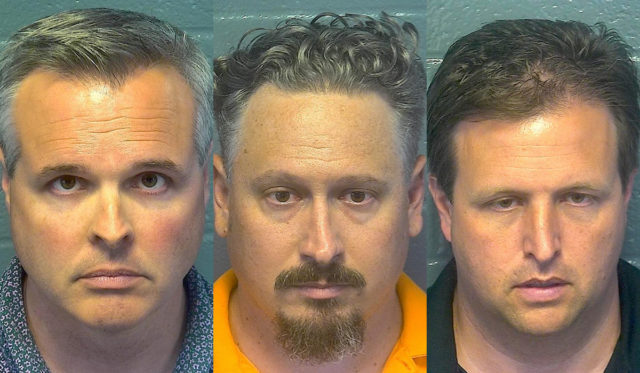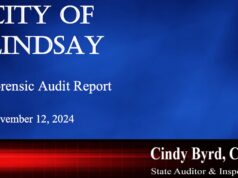

Along with former chief financial officer Josh Brock, Epic Charter Schools co-founders Ben Harris and David Chaney have been arrested on racketeering, embezzlement and conspiracy charges related to their use of public money under the school management company Epic Youth Services.
Oklahoma County District Attorney David Prater filed formal charges late Thursday afternoon, but the Oklahoma State Bureau of Investigation arrested the three men and booked them into the Oklahoma County Jail around 10 a.m. The agency distributed a press release discussing the arrests.
All three men have a $250,000 bond and are facing 11 total counts that include the following charges:
- Racketeering
- Conspiracy to commit a felony
- Embezzlement of state funds (six counts)
- Obtaining money by false pretense
- Violation of the Oklahoma Computer Crimes Act
- Submitting false documents to the state
OSBI, Prater and other law enforcement entities have spent years investigating allegations that Harris and Chaney embezzled state funds through the creation of Epic’s “Learning Fund,” which was maintained by Epic Youth Services, the school management company they owned.
“This has been a very complex and arduous investigation with many roadblocks causing delays in getting to the truth,” OSBI director Ricky Adams said in the agency’s press release. “Harris, Chaney and Brock came up with a ‘get rich quick scheme’ that lined their pockets with tax dollars that were to be spent for the benefit of Oklahoma students. The OSBI criminal investigation unraveled the intricate scheme layer by layer, in spite of a lack of cooperation, legal obstacles and delay tactics.”
Charter schools are publicly funded schools, and Epic’s two virtual charter schools — Epic Blended and Epic One-on-One — grew in popularity over the years as students and parents sought alternative education options. During the pandemic in 2020, Epic was the largest school district in the state.
The OSBI press release called Harris and Chaney’s efforts “a complicated criminal enterprise” totaling more than $22 million:
Through Epic Charter Schools, Epic Youth Services and the Student Learning Fund, a complicated criminal enterprise emerged that involved among other things: co-mingling of funds, excessive and unnecessary management fees, the use of Oklahoma tax dollars in California, political influence, concealment of profits, submission of false invoices, and the illegal use of employees. Over the years, the scheme resulted in a cost to the state of Oklahoma in excess of $22 million.
“We are grateful for the assistance of State Auditor & Inspector Cindy Byrd and multiple independent private audit agencies that helped throughout the investigation. I also want to thank District Attorney David Prater for pursing this case on behalf of Oklahoma students, their families and the tax payers,” said Adams.
In 2019, Gov. Kevin Stitt requested an audit of Epic from Byrd, who released her findings in October 2020. The final report was damning and led to about $20 million in state funds being recovered by the State Department of Education. The investigative audit showed EYS was receiving $0.10 of every $1 in taxpayer money paid to Epic. According to the affidavit filed Thursday, that fee generated more than $69 million for Harris and Chaney since 2013.
The criminal charging documents became available about 4:30 p.m. Thursday, and the affidavit said the EYS-charged fee generated more than $69 million for Harris and Chaney since 2013. Brock was a contract employee of EYS who served as the charter schools’ encumbrance clerk since they were founded.
The affidavit, written by OSBI agent Mark Drummond, outlined the close connections between Epic the schools and Epic Youth Services, which was owned by Harris and Chaney.
“EYS, the for-profit, did not have separate office space and utilized office space and equipment owned by the state of Oklahoma and located within the administrative offices of Epic,” Drummond wrote. “There was no clear line of distinction between Epic the charter school and EYS the for-profit management company. Chaney and Harris’ other companies and associated entities also shared the address and/or location of Community Strategies/Epic.”
The charging document is embedded below:
The long road to handcuffs
David Chaney and Ben Harris founded Epic Charter Schools in 2011 and also started Epic Youth Services as a private management company tasked with operating the schools. OSBI began looking into the charter schools in 2016, and state investigators raised concerns about how EYS managed state-allocated funds, ultimately publicizing allegations of fraud and abuse.
The Epic Charter Schools Board, referred to as Community Strategies, voted to cut ties with Epic Youth Services, Harris and Chaney at a meeting in May 2021.
The Oklahoma State Bureau of Investigation completed its final report on Harris, Chaney, Brock and their enterprise in February, with Prater successfully asking Attorney General John O’Connor to return authority over the investigation to him at that time.
Byrd’s investigative audit alleged that Epic owed the state millions of dollars owing to excessive administration costs and co-mingling public funds with Epic’s endeavors in California.
In December, the Oklahoma State Board of Education voted to withhold $9.1 million in state funding from Epic over 12 months. Combined with more than $10 million in penalties assessed by the State Department of Oklahoma in April and a handful of other fines, the state stands to recover about $20 million from Epic.
At a meeting of legislative education committees in February, Byrd said the financial mismanagement by Chaney and Harris is the “largest amount of reported abuse of taxpayer funds in the history of the state.”
During an October interim study held by the House of Representatives, new Epic board president Paul Campbell said Harris and Chaney carried out “nothing but a grift and a con job” while running the charter schools. He said the two men are “bad actors, period.”
Today, after learning of the charges filed against Harris, Chaney and Brock, Campbell softened his assessment slightly.
“Them being arrested is not surprising to me at all based on the evidence that I’ve seen,” Campbell said. “Whether they should be convicted or not, I have no idea. My preview and focus is on student outcomes.”
Campbell and current Epic leadership are also under fire for a new State Department of Education report released earlier this week. That report alleged unauthorized bonuses to Superintendent Bart Banfield and improperly reported enrollment statistics, which boosted school revenue from the state in Fiscal Year 2020-2021.
Epic is currently in the process of having a school district consolidation plan reviewed and approved by the State Department of Education that Epic Superintendent Bart Banfield believes could result in $4 to $8 million in savings owing to lower charter authorization fees, technology fees and personnel time savings and efficiencies. The Statewide Virtual Charter School Board, which sponsors Epic-One-on-One showed support of the plan at their own meeting in February.
Charter authorizers keep 3 percent of state funding received by their charter school as an administrative fee, and the SVCSB was criticized in the October 2020 investigative audit for its lack of oversight.
(Update: this article was updated at 4:30 p.m. Thursday, June 23, to include the criminal charging documents.)





















